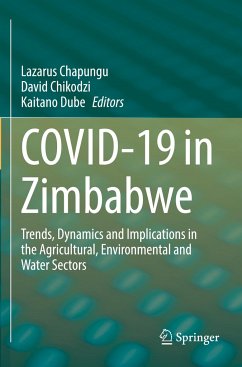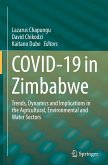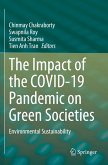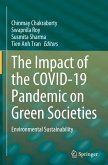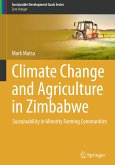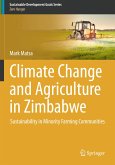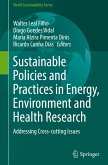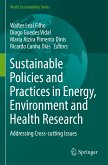COVID-19 in Zimbabwe
Trends, Dynamics and Implications in the Agricultural, Environmental and Water Sectors
Herausgegeben:Chapungu, Lazarus; Chikodzi, David; Dube, Kaitano
COVID-19 in Zimbabwe
Trends, Dynamics and Implications in the Agricultural, Environmental and Water Sectors
Herausgegeben:Chapungu, Lazarus; Chikodzi, David; Dube, Kaitano
- Broschiertes Buch
- Merkliste
- Auf die Merkliste
- Bewerten Bewerten
- Teilen
- Produkt teilen
- Produkterinnerung
- Produkterinnerung
This contributed volume, based on papers presented at a conference held in Zimbabwe in mid-2021, interrogates solutions to COVID-19-related problems and issues across agricultural, environmental and water sectors in Zimbabwe and assesses their scientific, economic and practical validity. Across 19 chapters, this volume unpacks the science, economics and politics of the pandemic with a focus on understanding its secondary and tertiary impact on Zimbabwe's population. The volume is also dedicated to understanding the practical and policy-oriented approaches in tackling the pandemic and…mehr
Andere Kunden interessierten sich auch für
![COVID-19 in Zimbabwe COVID-19 in Zimbabwe]() COVID-19 in Zimbabwe116,99 €
COVID-19 in Zimbabwe116,99 €![The Impact of the COVID-19 Pandemic on Green Societies The Impact of the COVID-19 Pandemic on Green Societies]() The Impact of the COVID-19 Pandemic on Green Societies117,69 €
The Impact of the COVID-19 Pandemic on Green Societies117,69 €![The Impact of the COVID-19 Pandemic on Green Societies The Impact of the COVID-19 Pandemic on Green Societies]() The Impact of the COVID-19 Pandemic on Green Societies93,99 €
The Impact of the COVID-19 Pandemic on Green Societies93,99 €![Climate Change and Agriculture in Zimbabwe Climate Change and Agriculture in Zimbabwe]() Mark MatsaClimate Change and Agriculture in Zimbabwe77,99 €
Mark MatsaClimate Change and Agriculture in Zimbabwe77,99 €![Climate Change and Agriculture in Zimbabwe Climate Change and Agriculture in Zimbabwe]() Mark MatsaClimate Change and Agriculture in Zimbabwe77,99 €
Mark MatsaClimate Change and Agriculture in Zimbabwe77,99 €![Sustainable Policies and Practices in Energy, Environment and Health Research Sustainable Policies and Practices in Energy, Environment and Health Research]() Sustainable Policies and Practices in Energy, Environment and Health Research169,99 €
Sustainable Policies and Practices in Energy, Environment and Health Research169,99 €![Sustainable Policies and Practices in Energy, Environment and Health Research Sustainable Policies and Practices in Energy, Environment and Health Research]() Sustainable Policies and Practices in Energy, Environment and Health Research169,99 €
Sustainable Policies and Practices in Energy, Environment and Health Research169,99 €-
-
-
This contributed volume, based on papers presented at a conference held in Zimbabwe in mid-2021, interrogates solutions to COVID-19-related problems and issues across agricultural, environmental and water sectors in Zimbabwe and assesses their scientific, economic and practical validity. Across 19 chapters, this volume unpacks the science, economics and politics of the pandemic with a focus on understanding its secondary and tertiary impact on Zimbabwe's population. The volume is also dedicated to understanding the practical and policy-oriented approaches in tackling the pandemic and confronting the "new normal" of COVID-19. It brings together researchers, development practitioners and policy makers from various disciplines in an endeavour to understand COVID-19 trends and analyse the scientific options for mitigation, containment, innovation and ultimately pre-empt the possible emergence and impacts of other pandemics in the future
Produktdetails
- Produktdetails
- Verlag: Springer / Springer International Publishing / Springer, Berlin
- Artikelnr. des Verlages: 978-3-031-21474-5
- 1st edition 2023
- Seitenzahl: 336
- Erscheinungstermin: 3. Januar 2024
- Englisch
- Abmessung: 235mm x 155mm x 19mm
- Gewicht: 511g
- ISBN-13: 9783031214745
- ISBN-10: 3031214749
- Artikelnr.: 69601662
- Herstellerkennzeichnung Die Herstellerinformationen sind derzeit nicht verfügbar.
- Verlag: Springer / Springer International Publishing / Springer, Berlin
- Artikelnr. des Verlages: 978-3-031-21474-5
- 1st edition 2023
- Seitenzahl: 336
- Erscheinungstermin: 3. Januar 2024
- Englisch
- Abmessung: 235mm x 155mm x 19mm
- Gewicht: 511g
- ISBN-13: 9783031214745
- ISBN-10: 3031214749
- Artikelnr.: 69601662
- Herstellerkennzeichnung Die Herstellerinformationen sind derzeit nicht verfügbar.
Lazarus Chapungu (Editor in Chief) researches on contemporary environmental issues, climate change, tourism, sustainable development and biodiversity management. He is currently a postdoctoral research fellow at the University of South Africa. He has worked as a senior lecturer and research chair in the Department of Physics, Geography and Environmental Science at Great Zimbabwe University. He served as a chapter scientist, contributing author and glossary editor in the 6th Assessment Report (AR6) of the Intergovernmental Panel on Climate Change, Working Group III Chapter 2. Lazarus holds the portfolio of Vice Chair of the programs committee of the board of directors at the Zimbabwe Council of Churches (ZCC), a non-governmental organization seeking to build community resilience to climate change and enable recovery from man-made and natural disasters. His qualifications include a PhD in Environmental Science, a Master's degree in Environmental Policy and Planning, a professional diploma in Applied Monitoring and Evaluation and a program certificate in project management. David Chikodzi (Co-Editor) has widely published on contemporary environmental issues, water, climate change, tourism, sustainable development and ecological systems. He is a Post-doctoral research fellow in the Exxaro Chair in Climate Change and Sustainable Transitions at the University of South Africa. He holds a PhD in Geography and Environment Science from the University of the Western Cape (South Africa), Masters' degree in Environmental Policy and Planning, as well as a Bachelor of Arts (Honours) Degree in Geography from the University of Zimbabwe (Zimbabwe). Kaitano Dube (Co-Editor) is an Associate Professor of Tourism Geography at Vaal University of Technology. He is a National Research of Foundation Y2 rated researcher who has researched and widely published (books and journal articles) on climate change,tourism, aviation, COVID-19 and sustainability. He is currently an editor of Tourism Geographies and Associate Editor of Frontiers in Sustainable Tourism. He holds a PhD in Environmental Management from the University of South Africa.
Chapter1. COVID-19 and its Implications for agriculture, environment, and water sectors.- Chapter2. COVID-19 plus: Addressing food security (SDG 2) and malnutrition within a web of disasters in the SADC region.- Chapter3. COVID-19 IN ZIMBABWE: IMPLICATIONS ON THE COMMERCIAL AGRICULTURAL SECTOR.- Chapter4. Strengthening local food systems in the context of COVID-19 pandemic: Lessons from Zimbabwe.- Chapter5. Contributions of small grains grown in Zimbabwe's dryland regions in boosting immunity and combating COVID-19.- Chapter6. The determinants of positive food procurement practices in COVID-19 affected communities: A cross sectional study conducted in Chiredzi Zimbabwe.- Chapter7. Understanding the dimensions of resilience for food and nutrition security among the informal traders during the COVID-19 pandemic in Zimbabwe.- Chapter8. COVID-19 and agricultural entrepreneurship in Zimbabwean townships: A systematic literature review.- Chapter9. Humanistic effects of COVID-19 pandemic on the informal sector in Zimbabwe.- Chapter10. The resilience of the small-scale commercial fishing sector to impacts of COVID-19 in Zimbabwe.- Chapter11. COVID-19 and the horticultural sector: Dynamics and implications for vendors and traders in the City of Masvingo, Zimbabwe.- Chapter12. Coping strategies and Livelihood Sustainability for Rural Women in the face of COVID-19: The case of Mutoko district, Zimbabwe.- Chapter13. Trends and dynamics of COVID-19 in Zimbabwe: Implications on Selected Sustainable Development Goals.- Chapter14. COVID-19's impacts on cities: insights on the provision of safe water, sanitation and waste management in Zimbabwe.- Chapter15. The paradox of 'water is life' in a water rationed city during the COVID-19 pandemic.- Chapter16. A CIPP-TOWS evaluation of blended learning for the Sciences and Mathematics during COVID-19: The case of Great Zimbabwe University.- Chapter17. Fake news, social media and the COVID-19 pandemic: The Zimbabwean experience.- Chapter18.COVID-19 infodemic and misinformation: A global review and implications for Zimbabwe.- Chapter19. Conclusions and Policy Recommendations: The Emerging COVID-19 Trends, Dynamics and Implications.
Chapter1. COVID-19 and its Implications for agriculture, environment, and water sectors.- Chapter2. COVID-19 plus: Addressing food security (SDG 2) and malnutrition within a web of disasters in the SADC region.- Chapter3. COVID-19 IN ZIMBABWE: IMPLICATIONS ON THE COMMERCIAL AGRICULTURAL SECTOR.- Chapter4. Strengthening local food systems in the context of COVID-19 pandemic: Lessons from Zimbabwe.- Chapter5. Contributions of small grains grown in Zimbabwe's dryland regions in boosting immunity and combating COVID-19.- Chapter6. The determinants of positive food procurement practices in COVID-19 affected communities: A cross sectional study conducted in Chiredzi Zimbabwe.- Chapter7. Understanding the dimensions of resilience for food and nutrition security among the informal traders during the COVID-19 pandemic in Zimbabwe.- Chapter8. COVID-19 and agricultural entrepreneurship in Zimbabwean townships: A systematic literature review.- Chapter9. Humanistic effects of COVID-19 pandemic on the informal sector in Zimbabwe.- Chapter10. The resilience of the small-scale commercial fishing sector to impacts of COVID-19 in Zimbabwe.- Chapter11. COVID-19 and the horticultural sector: Dynamics and implications for vendors and traders in the City of Masvingo, Zimbabwe.- Chapter12. Coping strategies and Livelihood Sustainability for Rural Women in the face of COVID-19: The case of Mutoko district, Zimbabwe.- Chapter13. Trends and dynamics of COVID-19 in Zimbabwe: Implications on Selected Sustainable Development Goals.- Chapter14. COVID-19's impacts on cities: insights on the provision of safe water, sanitation and waste management in Zimbabwe.- Chapter15. The paradox of 'water is life' in a water rationed city during the COVID-19 pandemic.- Chapter16. A CIPP-TOWS evaluation of blended learning for the Sciences and Mathematics during COVID-19: The case of Great Zimbabwe University.- Chapter17. Fake news, social media and the COVID-19 pandemic: The Zimbabwean experience.- Chapter18.COVID-19 infodemic and misinformation: A global review and implications for Zimbabwe.- Chapter19. Conclusions and Policy Recommendations: The Emerging COVID-19 Trends, Dynamics and Implications.

